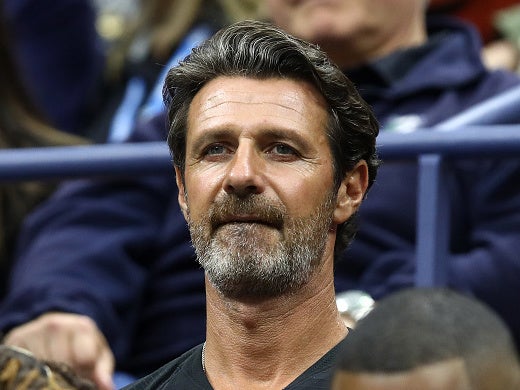Serena Williams coach Patrick Mouratoglou calls for on court coaching to be allowed
Mouratoglou was at the centre of the controversy at last month’s US Open when Williams became embroiled in a furious row with the umpire

Patrick Mouratoglou, the coach of Serena Williams, believes that on-court coaching should be allowed throughout tennis – and that coaches and players should be obliged to communicate on court in English so that television viewers can understand what they are saying.
Mouratoglou was at the centre of the controversy at last month’s US Open when Williams became embroiled in a furious row with the umpire, Carlos Ramos, during her defeat in the final to Naomi Osaka. The dispute started when Ramos gave Williams a code violation after ruling that Mouratoglou had been attempting to coach her during the match. On-court coaching is not allowed at Grand Slam tournaments.
Writing in his regular column in the autumn edition of “tennishead” magazine (tennishead.net), Mouratoglou argues that almost every other sport allows coaching during play.
“You see it all the time in team sports, with coaches instructing their players from the sidelines,” Mouratoglou says. “You also see it in individual sports. Boxers receive a constant stream of advice from their corners, cyclists on the road have radio contact with their teams and golfers are talking regularly to their caddies.”
Mouratoglou says that the no-coaching rule is regularly flouted in tennis. He also points out that coaching is already being allowed in many areas of the sport away from the Grand Slam tournaments.
For example, players are allowed to call their coaches on to the court in tournaments on the women’s tour and captains sit on the court during Davis Cup and Fed Cup ties. The US Open also allowed on-court coaching in qualifying and in junior matches this summer.
Mouratoglou believes that showing the interaction between players and coaches on television would help to popularise tennis. “Seeing and hearing the coaches and players talking to each other personalises the sport and brings out their characters,” he writes. “Listening to the communication between a player and a coach can be very interesting and can provide real insight into the game.
“Emotions can run high when coaches talk to their players during matches. Sometimes the players don’t like to hear what their coaches are saying, but this all adds to the drama.
“Sometimes you see a coach trying to calm the player down. On other occasions, the coach’s intervention might make the player angry, but it might also produce a great reaction from the player on the court. It’s all a very good way of showing how coaches do their work and how players react to them.”
Mouratoglou believes it is important to get spectators “emotionally involved” in the action. “You want spectators and TV viewers to have opinions about the players – and the coaches - and to know who they like and don’t like,” he explains.
“If we don’t involve people in this way, then tennis is only ever going to be followed by pure tennis lovers. To attract new fans we need to offer more than just the sport itself. We need to show them the personalities of the people they are watching.”
If on-court coaching is allowed Mouratoglou thinks it should be obligatory for players and coaches to communicate in English, for the benefit of TV viewers.
“It’s important that TV viewers can understand what is being said, even if it’s through the commentators translating and explaining what the coach and the player have been saying,” he says. “Having the commentators discussing what the coach and player have been talking about all adds to the interest.
“If the coach and player are communicating in Slovakian or Arabic or Mandarin, most people – including the commentators – aren’t going to understand what is being said.
“English is the international language of tennis. I know there are some coaches, even at a high level, who do not speak very good English, but that is not right. We are professional coaches. We travel on the tour all year and we’re supposed to speak English.”
Subscribe to Independent Premium to bookmark this article
Want to bookmark your favourite articles and stories to read or reference later? Start your Independent Premium subscription today.

Join our commenting forum
Join thought-provoking conversations, follow other Independent readers and see their replies